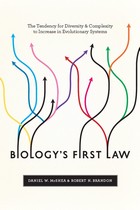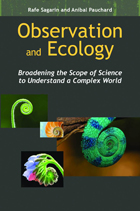
Life on earth is characterized by three striking phenomena that demand explanation: adaptation—the marvelous fit between organism and environment; diversity—the great variety of organisms; and complexity—the enormous intricacy of their internal structure. Natural selection explains adaptation. But what explains diversity and complexity? Daniel W. McShea and Robert N. Brandon argue that there exists in evolution a spontaneous tendency toward increased diversity and complexity, one that acts whether natural selection is present or not. They call this tendency a biological law—the Zero-Force Evolutionary Law, or ZFEL. This law unifies the principles and data of biology under a single framework and invites a reconceptualization of the field of the same sort that Newton’s First Law brought to physics.
Biology’s First Law shows how the ZFEL can be applied to the study of diversity and complexity and examines its wider implications for biology. Intended for evolutionary biologists, paleontologists, and other scientists studying complex systems, and written in a concise and engaging format that speaks to students and interdisciplinary practitioners alike, this book will also find an appreciative audience in the philosophy of science.

The need to understand and address large-scale environmental problems that are difficult to study in controlled environments—issues ranging from climate change to overfishing to invasive species—is driving the field of ecology in new and important directions. Observation and Ecology documents that transformation, exploring how scientists and researchers are expanding their methodological toolbox to incorporate an array of new and reexamined observational approaches—from traditional ecological knowledge to animal-borne sensors to genomic and remote-sensing technologies—to track, study, and understand current environmental problems and their implications.
The authors paint a clear picture of what observational approaches to ecology are and where they fit in the context of ecological science. They consider the full range of observational abilities we have available to us and explore the challenges and practical difficulties of using a primarily observational approach to achieve scientific understanding. They also show how observations can be a bridge from ecological science to education, environmental policy, and resource management.
Observations in ecology can play a key role in understanding our changing planet and the consequences of human activities on ecological processes. This book will serve as an important resource for future scientists and conservation leaders who are seeking a more holistic and applicable approach to ecological science.
READERS
Browse our collection.
PUBLISHERS
See BiblioVault's publisher services.
STUDENT SERVICES
Files for college accessibility offices.
UChicago Accessibility Resources
home | accessibility | search | about | contact us
BiblioVault ® 2001 - 2024
The University of Chicago Press









